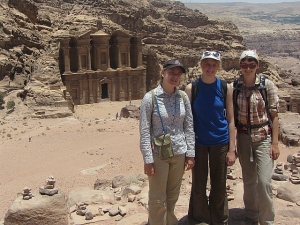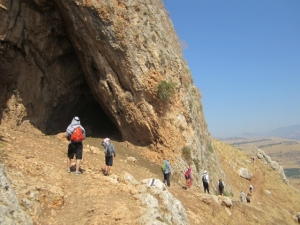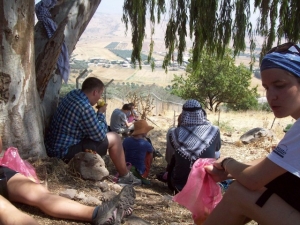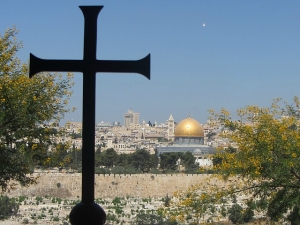On our last morning in Jerusalem, I wanted to savor the beauty of the city from the rooftop of our hostel – alone.  I rose at 5:00, a full hour after the haunting call to prayer which echoes across the city five times each day, saturating the air with religion. Indeed, the daily world of the Middle East is buzzing with voices which reflect faith in God, which is both the bane and beauty of this place.
As I mount the arching Hogwarts-style steps to the roof, my mind begins to replay the words of the many people I have encountered on our travels here.  I remember the enthusiasm of the Jesus Trail founder, Maoz, and his handsome grinning brown face, as he described the hills that Christ walked near the Sea of Galilee, that blue jewel of the north. I remember the eagerness of Dani, the taxi driver, urging us to eat more of the honey cakes and special coffee he had brought for our lunch on the first day of hiking. I loved the pride of our host in Cana, as she announced, “I will be cooking for you, all Arabic food.†And of course there was wine in Cana. I remember the astonishment at our early arrival in the soft voice of the goat farmer whose grandfather had owned this settler land, and the bleating voices of goats and roosters throughout the night, reminding me that Jesus had surely lived among farmers and herders such as these. I remember the sadness of Gefan, our Israeli hotel owner’s son in Arbel, who was returning for a week of army duty which he hated, as he would be going to “an area of danger – they are always areas of danger,†he sighed.
 I remember the bright intelligence of Sadam, our Jordan guide, who filled us in on the “correct†details of historic Petra, and I remember the harsh business voice of Rosa, high up on the rocky Petra trails, who convincingly sold me four necklaces at “best†bargain prices.  But I also remember the eager-to-please hotel manager at the Amra Palace Hotel who was so anxious that we should be happy, that after I explained that I was partially deaf and wore hearing aids, he exclaimed, “I hope you get better soon.â€Â And I remember the voice of the Indonesian masseuse whose limited English never-the-less commanded me to disrobe for the body scrubbing of my life, and the eager voices of the male attendants who accepted my tip for her, an injustice that still rankles in my heart.
I remember the bright intelligence of Sadam, our Jordan guide, who filled us in on the “correct†details of historic Petra, and I remember the harsh business voice of Rosa, high up on the rocky Petra trails, who convincingly sold me four necklaces at “best†bargain prices.  But I also remember the eager-to-please hotel manager at the Amra Palace Hotel who was so anxious that we should be happy, that after I explained that I was partially deaf and wore hearing aids, he exclaimed, “I hope you get better soon.â€Â And I remember the voice of the Indonesian masseuse whose limited English never-the-less commanded me to disrobe for the body scrubbing of my life, and the eager voices of the male attendants who accepted my tip for her, an injustice that still rankles in my heart.
In the Wadi Rum, I remember the soft spoken Abdullah, our desert jeep driver and the unspoken confidence conveyed to me in the strong hand grip of Zedan, the Bedouin leader at our desert camp, as he assisted me across the treacherous rock bridge in the sky with its death precipices below. I still can see  Zedan standing on the front of the jeep’s hood, face to the wind as he and Abdullah, who was driving from the back seat, perform stunts that belong in a modern Hollywood version of Lawrence of Arabia. And I remember the braying voices of the camels, as we raced over the beautiful red sands of the desert, breathing in the perfume of the cleanest air in our world.
Zedan standing on the front of the jeep’s hood, face to the wind as he and Abdullah, who was driving from the back seat, perform stunts that belong in a modern Hollywood version of Lawrence of Arabia. And I remember the braying voices of the camels, as we raced over the beautiful red sands of the desert, breathing in the perfume of the cleanest air in our world.
I still can hear the intensity of Ibram, our Palestinian guide who was imprisoned for two years without trial as a “security†risk and who passionately showed us his people’s lands now occupied.  I remember the tired voice of Amahl, our Arab billet host, who described how she would prepare meals hurriedly in her Bethlehem kitchen, and then take her young daughter and hide under the stone steps of her flat during the Israeli shelling of the Church of the Nativity.  And I remember the disheartened Israeli voice of our ICAHD (Israeli Committee Against House (Palestinian) Demolitions) guide, as she responded to our questions about the future – “NO HOPE†was her reply. But she took us to visit the bulldozed home of a Palestinian father, whose eager voice lifted our hearts as he explained how he was preparing to rebuild his home for the fifth time, and that UN observers would be his lunch guests on Friday.
And I remember the disheartened Israeli voice of our ICAHD (Israeli Committee Against House (Palestinian) Demolitions) guide, as she responded to our questions about the future – “NO HOPE†was her reply. But she took us to visit the bulldozed home of a Palestinian father, whose eager voice lifted our hearts as he explained how he was preparing to rebuild his home for the fifth time, and that UN observers would be his lunch guests on Friday.
And in Jerusalem, as I climb the steps to the rooftop, I remember the eager voices of all our students as they echoed my own wonder at this remarkable place in the world where God has touched humankind in such a profound way that we sadly fight and squabble to own His attention more vehemently than elsewhere on the planet, it seems.
 I look down to the street, Via Delarosa, where Christ carried his cross, right there, on those ancient stones below me.  I see a young girl in a wheelchair, waiting to be picked up for school. Her father sits beside her. Down the street, a shopkeeper hangs up orange and yellow galabeyas from his overhead awning, and black-haired ten year olds play soccer on the street where Christ walked. “What are their lives like?†I wonder. I remember back to all I have met and heard. Their voices are unique here, different, and yet, as I see the father lovingly lift his handicapped daughter into the school van, I understand that in many ways, the world is the same. God, our Father is lovingly guiding us all as we struggle everywhere to find Him.
I look down to the street, Via Delarosa, where Christ carried his cross, right there, on those ancient stones below me.  I see a young girl in a wheelchair, waiting to be picked up for school. Her father sits beside her. Down the street, a shopkeeper hangs up orange and yellow galabeyas from his overhead awning, and black-haired ten year olds play soccer on the street where Christ walked. “What are their lives like?†I wonder. I remember back to all I have met and heard. Their voices are unique here, different, and yet, as I see the father lovingly lift his handicapped daughter into the school van, I understand that in many ways, the world is the same. God, our Father is lovingly guiding us all as we struggle everywhere to find Him.
